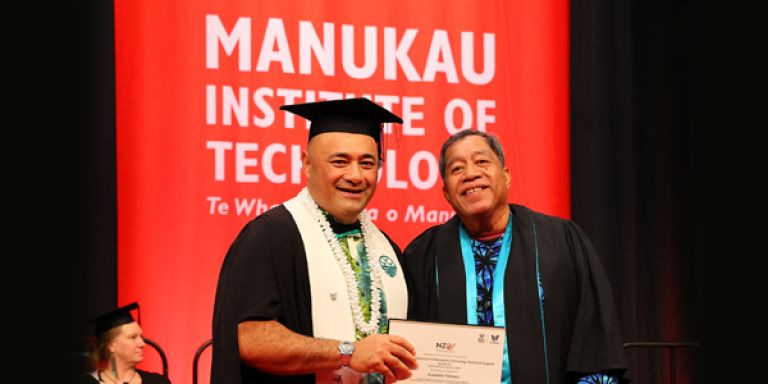Duration and study methods
The maximum time to complete this programme part-time is 3 years.Programme structure
Start dates
Qualification
Credits
Location
Domestic fees
International fees
NZD $13,000 (approx) per 60 credits
Free* study
Programme highlights
More qualified graduates are needed to fill well-paid roles in Information Technology (IT).
This qualification will provide you with key skills in IT, including:
- Computer hardware
- Operating systems and applications (apps)
- Software development
- Web development
- User experience
- Interface design.
The technical and core skills you will learn will help you progress to further study in IT.
Entry requirements
All applicants must have a minimum of 4 years of secondary education, and a completed NCEA Level 1; or
New Zealand Certificate in Computing (User Fundamentals) (Level 2); or
New Zealand Certificate in Computing (Foundation User) (Level 2); or
New Zealand Certificate in Computing (Intermediate User) (Level 3); or
New Zealand Certificate in Study and Career Preparation (Level 3); or
Equivalent.
All applicants to this programme are also recommended to hold appropriate assessment standards in Digital Technologies Level 2.
Applicants must have achieved a minimum standard of English as demonstrated by a minimum of 12 credits at NCEA Level 1 in English.
International applicants must also meet the English Language Entry Requirements as set out in the NZQF Programme and Accreditation Rules.
International students will generally be required to provide evidence of English language proficiency, for this programme an IELTS General or Academic score of 5.5 with no band score lower than 5 is required. Equivalent acceptable evidence can be seen at the following NZQA link.
Special & discretionary admission
Any ākonga who is 20 years of age or older and has not reached the general admission requirements for their intended programme is eligible for Special Admission. MIT works with the ākonga to ensure they are prepared for their intended programme. Any ākonga who is not yet 20 years of age and has not reached the general admission requirements for their intended programme may be eligible for Discretionary Admission. In assessing whether to grant Discretionary Admission, the delegated authority focuses on the applicant’s level of preparedness for their intended programme.
Give yourself credit with Recognition of Prior Learning (RPL)
Did you know you can use the knowledge and experience you already have to your advantage?
Your previous work experience and on-the-job skills, volunteering, professional development, and other providers’ qualifications can be recognised as prior learning, matched against credits in our courses, and put towards your qualification – potentially saving you money and possibly helping you to complete your qualification faster Learn more.
Programme structure
You will need to complete the below four courses (60 credits):
566.404 IT Foundations (15 credits)
566.405 Web design foundations (15 credits)
566.406 Programming foundations (15 credits)
566.407 Database project (15 credits)
Do you want to study a single course, without enrolling into the full programme?
Courses within some of our programmes may be offered as an individual Certificate of Proficiency (COP). Programme entry requirements and course fees apply. For more information, please speak to our friendly Ask Me! team.
Further training or study
- New Zealand Diploma in Information Technology Technical Support (Level 5)
- Bachelor of Digital Technologies (Level 7) Majors in Networking, Software and Web Development and Data Analytics
Career opportunities
You will gain experience with all aspects of IT from computer hardware, operating systems, applications, databases and networks to software development, project management, web, user experience, and interface design.
This combination of technical and core skills will prepare you for employment in a range of entry-level support roles in an organisation, which may include business support or retail roles, and some roles in the IT profession under broad guidance. For potential salaries visit careers.govt.nz.
See why more people choose Digital Technologies at MIT

“Come as you are – you’ll go out ready to build the communities.”

“Prior to studying at MIT I was working for more than 30 years. I had a passion for information technology back then – and it’s still one of my favourite subjects. I started studying at MIT in the year 2000, and did not complete. I decided I should finish my IT qualification at the school I first studied when I migrated to New Zealand. I started when I was 64-years-old and graduated at 66.
I enjoyed the company of my fellow students and lecturers at MIT – a multi-ethnicity and multi-cultural institution. MIT is people centered. The lecturers were helpful and tailored their courses to the needs of the students and the industries. Most of our IT lecturers had previous work experience, so theory and practical are taught in tandem. The online sessions for me personally were a blessing in disguise.
I’m now working in remote data collection with a consultancy business in the climate change and weather sector.
My advice is that whether you are school leavers or have plenty of experience, MIT has course structures to cater for all levels of education.
Come as you are – you’ll go out ready to build the communities.”
Ausetalia Titimaea
MIT graduate

MIT is the quality choice. Study digital technologies and graduate work-ready.

“Everyone I graduated with got jobs quickly.”

“I chose to study at MIT after attending an open day and meeting the lecturers who I felt could help me get the right start in my career. It was a great choice. During my studies for a Bachelor of Information Systems, I gained expert knowledge, tools and valuable industry experience through an internship. I’m dyslexic but the open learning style at MIT allowed me to overcome any potential disadvantage from this.
Everyone I graduated with got jobs quickly, and there are so many opportunities with ICT in New Zealand and overseas. I’m working as a web developer, which I love. Thanks to what I learnt at MIT I can quickly pick up new technologies and techniques, and use them effectively in my job.
My employer has commented on the strong industry knowledge I gained at MIT and the new ideas I continue to bring to the company.”
Louis Rogers
MIT graduate

“My qualification is recognised everywhere in the world.”

“I chose to study at MIT because of its strong academic reputation. The graduate diploma allowed me to develop industry-specific skills and the professors are world-class.
The training I gained in the IT industry set me up for a career in almost any sector I could imagine including financial services, education, transportation, manufacturing, oil and gas, government, hospitality and healthcare. Graduates with ICT and networking skills are in short supply worldwide.
Since graduating, I have got a job as a service desk engineer, providing technical services to the company and customers.
My qualification is recognised anywhere in the world. MIT has given me an excellent foundation to be an immediate contributor to the IT field and for achieving my goal of becoming a managed services engineer.”
Navdeep Kaur
MIT graduate

“I want to aim for my bachelors and try to make it in life.”

“After leaving high school I was a little lost but I enjoyed playing on the computer as a hobby, so I decided I would give digital technologies a try. The course teaches us a lot about web design and coding. It is difficult but also really fun.
After studying you can go and work in IT or you can use your skills to build your own websites, so it will help if you want to start a career in that.
What I enjoy most about MIT is the opportunity to make new friends. It’s a fun and outgoing atmosphere here. You learn new things every day. I want to aim for my bachelors and try to make it in life.”
Jorden Souriyavong
MIT student

“There are so many success stories from MIT.”

“There are so many success stories from MIT – I knew right away this was the place to start my future.
I’ve always been interested in computers and wanted to know more, so taking the next step to pursue this as a career was a natural choice. I chose to study a Bachelor of ICT to learn the fundamentals and am now qualified to go straight into the industry. There are so many job opportunities open to me, which is really exciting.
As a female, studying in a male-dominated sector was a little intimidating at first, but the support of the people around me, including the lecturers, gave me the confidence to believe in myself.
My advice to anyone considering MIT would be to not let anything stand in the way of pursuing your dreams.”
Sam Khiev
MIT graduate

“It provides you with so many practical skills, life skills and even social skills.”

“I chose this subject because it’s always been a passion of mine. Since I was a 4-year old I was playing with computers. This just felt like the right place to come.
We are studying a range of exciting courses like technical support, computer architecture, and software development. We are learning how to code, create websites, assemble and disassemble computers. If you are ever interested in working in the software or hardware side of things then computer development is for you, that’s what you want to do. It provides you with so many practical skills, life skills, and even social skills.
My goal is to land a safe and steady job that will allow me to provide for myself and other people.”
Daniel Owen tongia-Lennon
MIT student

“My advice is to come along because it’s a great place to be.”

“I am an international student. I study digital technologies, majoring in software development.
My husband is an IT guy, that is where my interest in the subject started from. I think it’s pretty cool. MIT is a great place to be. I have been at other institutes and MIT is the most practical. IT is a really interesting subject because you really have to understand the logic before you can further progress.
I want to further myself and see if I can go further in this area because I really enjoy it. My advice is to come along because it’s a great place to be.”
Guiyu Fei (Tracy)
MIT student

“MIT is home and family who will always have a piece of my heart.”

“Through the years of studying at MIT, I never thought I’d find a place I could really call home for me after studying elsewhere. Through all the ups and downs, I’ve loved the connections and experiences I’ve had with both my fellow graduates and lecturers.
It is many thanks to MIT that I’ve seen myself grow into a person that I hope MIT can be proud of. MIT is home and family who will always have a piece of my heart.”
Fran Frandi
MIT graduate

“I graduated from MIT as the highest paid software and web development graduate.”

“I graduated MIT as the highest paid software and web development graduate, all thanks to MIT for providing me with the soft and technical skills, practical experience and valuable knowledge that I wouldn’t get anywhere else.
MIT is by far the most unique educational facility I have experienced to date, that is because MIT has a different learning approach that is very engaging and practical. I fell in love with MIT because of how the courses were delivered. The lecturers were highly engaged with students one-on-one and there was so much practical hands-on experience that wasn’t available elsewhere.”
Sabrina Papps
MIT graduate
Get a real-life industry experience at MIT
“I gained the soft and technical skills that employers want. No other institution’s quite the same as MIT.”
When studying digital technologies at level 7 (or higher) with MIT you’ll learn to apply your academic skills and knowledge as you complete a real-life industry placement in the workplace. Find out how Sabrina’s industry experience and bachelor qualification helped her secure a job as a business analysist with Westpac.

“MIT has a great reputation for being more than just a place of education.”

“MIT is known for helping to build, mould and prepare students with the experience, knowledge, skills, and confidence to make the world a better place. So, I knew this would be the right place to begin this part of my journey.”
No matter what stage in your life journey you are at, MIT is a great choice for you to begin or continue with your education. Whether you are straight out of high school or looking for a fresh new start, MIT will have many options to choose from. Courses are delivered in a way that keep you engaged, connected and involved with your learning and as a bonus, you get to meet great people along the way.
Education is key to success and MIT has played a pivotal part as the foundation of what I have accomplished so far. I have found myself no longer holding back but knowing I have the potential and mindset to achieve and follow my dreams.
MIT has a unique and diverse culture that makes you feel accepted and a sense of belonging.”
Jacinta Fue
MIT digital technologies graduate

“MIT is one of the best and highly reputed institutes in New Zealand.”

“Since graduating, I have landed a job as an analyst at one of the largest companies in New Zealand where I can see a huge potential for my career growth in the next five years. All this has been possible due to meticulously drafted course material and highly skilled teaching staff at MIT.
The course I took at MIT was designed in such a way that it prepares students for real world jobs. More stress is given on learning by doing.”
Bhupinder (Bobby) Singh
MIT graduate

“MIT has a lot of options, and you can choose what you prefer.”

“My time at MIT has been great. I met so many friends and had so many experiences. I was part of the student council, so we got to work with MIT staff and see the great work that they do, and how much they care about the students.
The advice I would give to people looking to study would be just go for it. Give it a go. MIT has a lot of options, and you can choose what you prefer.”
Mario Aguirre Lopez
MIT graduate

“My qualification gave me a chance to enter the IT industry.”

“I was working as a contact centre agent but wanted to learn more about technology and gain a high-quality education.
The campus is very nice, and I preferred studying on campus and interacting with classmates and the lecturers. The lecturers were very supportive, and I enjoyed how they delivered the knowledge – they really helped me to understand the course and gave me very informative answers to my questions.
My qualification helped me a lot and gave me a chance to enter the IT industry.”
Darwin Dula
MIT graduate

“I chose MIT because of the diversity, there’s a lot of different cultures here.”

“My experience at MIT was really good and I enjoyed it. My teachers were helpful and it’s always good to go to them and ask them questions. I chose MIT because of the diversity, there’s a lot of different cultures here and you meet heaps of new people.
My favorite part of coming to MIT is just making new friends and meeting new people, especially in the field that you’re studying.”
Sitani Moa
MIT graduate

“Almost everything I learnt at MIT is transferred to my work today.”

“Currently I’m employed working in my dream field. Almost everything I learnt at MIT is transferred to my work today. I actually use those skills every day.
I left school when I was 15 without my NCEA level 1. My experience at MIT was like nothing I’ve experienced before.
The lecturers are very flexible and really encourage and push you to improve your skills. I haven’t had that experience anywhere else. They have a star-studded line up of lecturers and I’ve only got good things to say.”
Levi Marsh-Nichols
MIT graduate

“My qualification has unlocked a multitude of opportunities.”

“I specifically chose MIT due to its outstanding reputation, which had been consistently praised by many. Throughout my time at MIT, I developed a strong affinity for the knowledgeable professors and forged meaningful connections with fellow students. The hands-on approach to learning at MIT was particularly enjoyable, as it made each day exciting and engaging. I hold my professors in high regard, as they played a pivotal role in guiding me through my studies.
At MIT, I acquired a solid foundation in IT fundamentals, as well as the technical skills required to navigate diverse IT scenarios. The industry placement component provided invaluable practical experience, allowing me to put theoretical knowledge into real-world practice. This immersive experience not only motivated me but also fostered a genuine interest in the field, equipping me with troubleshooting abilities and a deeper understanding of workplace challenges.
Thanks to my degree from MIT, I was able to secure a position as a Graduate Consultant, where I am responsible for providing support to clients. The comprehensive education and practical training I received at MIT have proven instrumental in my current role, enabling me to effectively address and resolve issues within my work environment.”
Nehaal Prasad
MIT graduate
See why more people choose Digital Technologies at MIT

“Come as you are – you’ll go out ready to build the communities.”

“Prior to studying at MIT I was working for more than 30 years. I had a passion for information technology back then – and it’s still one of my favourite subjects. I started studying at MIT in the year 2000, and did not complete. I decided I should finish my IT qualification at the school I first studied when I migrated to New Zealand. I started when I was 64-years-old and graduated at 66.
I enjoyed the company of my fellow students and lecturers at MIT – a multi-ethnicity and multi-cultural institution. MIT is people centered. The lecturers were helpful and tailored their courses to the needs of the students and the industries. Most of our IT lecturers had previous work experience, so theory and practical are taught in tandem. The online sessions for me personally were a blessing in disguise.
I’m now working in remote data collection with a consultancy business in the climate change and weather sector.
My advice is that whether you are school leavers or have plenty of experience, MIT has course structures to cater for all levels of education.
Come as you are – you’ll go out ready to build the communities.”
Ausetalia Titimaea
MIT graduate

MIT is the quality choice. Study digital technologies and graduate work-ready.

“Everyone I graduated with got jobs quickly.”

“I chose to study at MIT after attending an open day and meeting the lecturers who I felt could help me get the right start in my career. It was a great choice. During my studies for a Bachelor of Information Systems, I gained expert knowledge, tools and valuable industry experience through an internship. I’m dyslexic but the open learning style at MIT allowed me to overcome any potential disadvantage from this.
Everyone I graduated with got jobs quickly, and there are so many opportunities with ICT in New Zealand and overseas. I’m working as a web developer, which I love. Thanks to what I learnt at MIT I can quickly pick up new technologies and techniques, and use them effectively in my job.
My employer has commented on the strong industry knowledge I gained at MIT and the new ideas I continue to bring to the company.”
Louis Rogers
MIT graduate

“My qualification is recognised everywhere in the world.”

“I chose to study at MIT because of its strong academic reputation. The graduate diploma allowed me to develop industry-specific skills and the professors are world-class.
The training I gained in the IT industry set me up for a career in almost any sector I could imagine including financial services, education, transportation, manufacturing, oil and gas, government, hospitality and healthcare. Graduates with ICT and networking skills are in short supply worldwide.
Since graduating, I have got a job as a service desk engineer, providing technical services to the company and customers.
My qualification is recognised anywhere in the world. MIT has given me an excellent foundation to be an immediate contributor to the IT field and for achieving my goal of becoming a managed services engineer.”
Navdeep Kaur
MIT graduate

“I want to aim for my bachelors and try to make it in life.”

“After leaving high school I was a little lost but I enjoyed playing on the computer as a hobby, so I decided I would give digital technologies a try. The course teaches us a lot about web design and coding. It is difficult but also really fun.
After studying you can go and work in IT or you can use your skills to build your own websites, so it will help if you want to start a career in that.
What I enjoy most about MIT is the opportunity to make new friends. It’s a fun and outgoing atmosphere here. You learn new things every day. I want to aim for my bachelors and try to make it in life.”
Jorden Souriyavong
MIT student

“There are so many success stories from MIT.”

“There are so many success stories from MIT – I knew right away this was the place to start my future.
I’ve always been interested in computers and wanted to know more, so taking the next step to pursue this as a career was a natural choice. I chose to study a Bachelor of ICT to learn the fundamentals and am now qualified to go straight into the industry. There are so many job opportunities open to me, which is really exciting.
As a female, studying in a male-dominated sector was a little intimidating at first, but the support of the people around me, including the lecturers, gave me the confidence to believe in myself.
My advice to anyone considering MIT would be to not let anything stand in the way of pursuing your dreams.”
Sam Khiev
MIT graduate

“It provides you with so many practical skills, life skills and even social skills.”

“I chose this subject because it’s always been a passion of mine. Since I was a 4-year old I was playing with computers. This just felt like the right place to come.
We are studying a range of exciting courses like technical support, computer architecture, and software development. We are learning how to code, create websites, assemble and disassemble computers. If you are ever interested in working in the software or hardware side of things then computer development is for you, that’s what you want to do. It provides you with so many practical skills, life skills, and even social skills.
My goal is to land a safe and steady job that will allow me to provide for myself and other people.”
Daniel Owen tongia-Lennon
MIT student

“My advice is to come along because it’s a great place to be.”

“I am an international student. I study digital technologies, majoring in software development.
My husband is an IT guy, that is where my interest in the subject started from. I think it’s pretty cool. MIT is a great place to be. I have been at other institutes and MIT is the most practical. IT is a really interesting subject because you really have to understand the logic before you can further progress.
I want to further myself and see if I can go further in this area because I really enjoy it. My advice is to come along because it’s a great place to be.”
Guiyu Fei (Tracy)
MIT student

“MIT is home and family who will always have a piece of my heart.”

“Through the years of studying at MIT, I never thought I’d find a place I could really call home for me after studying elsewhere. Through all the ups and downs, I’ve loved the connections and experiences I’ve had with both my fellow graduates and lecturers.
It is many thanks to MIT that I’ve seen myself grow into a person that I hope MIT can be proud of. MIT is home and family who will always have a piece of my heart.”
Fran Frandi
MIT graduate

“I graduated from MIT as the highest paid software and web development graduate.”

“I graduated MIT as the highest paid software and web development graduate, all thanks to MIT for providing me with the soft and technical skills, practical experience and valuable knowledge that I wouldn’t get anywhere else.
MIT is by far the most unique educational facility I have experienced to date, that is because MIT has a different learning approach that is very engaging and practical. I fell in love with MIT because of how the courses were delivered. The lecturers were highly engaged with students one-on-one and there was so much practical hands-on experience that wasn’t available elsewhere.”
Sabrina Papps
MIT graduate
Get a real-life industry experience at MIT
“I gained the soft and technical skills that employers want. No other institution’s quite the same as MIT.”
When studying digital technologies at level 7 (or higher) with MIT you’ll learn to apply your academic skills and knowledge as you complete a real-life industry placement in the workplace. Find out how Sabrina’s industry experience and bachelor qualification helped her secure a job as a business analysist with Westpac.

“MIT has a great reputation for being more than just a place of education.”

“MIT is known for helping to build, mould and prepare students with the experience, knowledge, skills, and confidence to make the world a better place. So, I knew this would be the right place to begin this part of my journey.”
No matter what stage in your life journey you are at, MIT is a great choice for you to begin or continue with your education. Whether you are straight out of high school or looking for a fresh new start, MIT will have many options to choose from. Courses are delivered in a way that keep you engaged, connected and involved with your learning and as a bonus, you get to meet great people along the way.
Education is key to success and MIT has played a pivotal part as the foundation of what I have accomplished so far. I have found myself no longer holding back but knowing I have the potential and mindset to achieve and follow my dreams.
MIT has a unique and diverse culture that makes you feel accepted and a sense of belonging.”
Jacinta Fue
MIT digital technologies graduate

“MIT is one of the best and highly reputed institutes in New Zealand.”

“Since graduating, I have landed a job as an analyst at one of the largest companies in New Zealand where I can see a huge potential for my career growth in the next five years. All this has been possible due to meticulously drafted course material and highly skilled teaching staff at MIT.
The course I took at MIT was designed in such a way that it prepares students for real world jobs. More stress is given on learning by doing.”
Bhupinder (Bobby) Singh
MIT graduate

“MIT has a lot of options, and you can choose what you prefer.”

“My time at MIT has been great. I met so many friends and had so many experiences. I was part of the student council, so we got to work with MIT staff and see the great work that they do, and how much they care about the students.
The advice I would give to people looking to study would be just go for it. Give it a go. MIT has a lot of options, and you can choose what you prefer.”
Mario Aguirre Lopez
MIT graduate

“My qualification gave me a chance to enter the IT industry.”

“I was working as a contact centre agent but wanted to learn more about technology and gain a high-quality education.
The campus is very nice, and I preferred studying on campus and interacting with classmates and the lecturers. The lecturers were very supportive, and I enjoyed how they delivered the knowledge – they really helped me to understand the course and gave me very informative answers to my questions.
My qualification helped me a lot and gave me a chance to enter the IT industry.”
Darwin Dula
MIT graduate

“I chose MIT because of the diversity, there’s a lot of different cultures here.”

“My experience at MIT was really good and I enjoyed it. My teachers were helpful and it’s always good to go to them and ask them questions. I chose MIT because of the diversity, there’s a lot of different cultures here and you meet heaps of new people.
My favorite part of coming to MIT is just making new friends and meeting new people, especially in the field that you’re studying.”
Sitani Moa
MIT graduate

“Almost everything I learnt at MIT is transferred to my work today.”

“Currently I’m employed working in my dream field. Almost everything I learnt at MIT is transferred to my work today. I actually use those skills every day.
I left school when I was 15 without my NCEA level 1. My experience at MIT was like nothing I’ve experienced before.
The lecturers are very flexible and really encourage and push you to improve your skills. I haven’t had that experience anywhere else. They have a star-studded line up of lecturers and I’ve only got good things to say.”
Levi Marsh-Nichols
MIT graduate

“My qualification has unlocked a multitude of opportunities.”

“I specifically chose MIT due to its outstanding reputation, which had been consistently praised by many. Throughout my time at MIT, I developed a strong affinity for the knowledgeable professors and forged meaningful connections with fellow students. The hands-on approach to learning at MIT was particularly enjoyable, as it made each day exciting and engaging. I hold my professors in high regard, as they played a pivotal role in guiding me through my studies.
At MIT, I acquired a solid foundation in IT fundamentals, as well as the technical skills required to navigate diverse IT scenarios. The industry placement component provided invaluable practical experience, allowing me to put theoretical knowledge into real-world practice. This immersive experience not only motivated me but also fostered a genuine interest in the field, equipping me with troubleshooting abilities and a deeper understanding of workplace challenges.
Thanks to my degree from MIT, I was able to secure a position as a Graduate Consultant, where I am responsible for providing support to clients. The comprehensive education and practical training I received at MIT have proven instrumental in my current role, enabling me to effectively address and resolve issues within my work environment.”
Nehaal Prasad
MIT graduate






